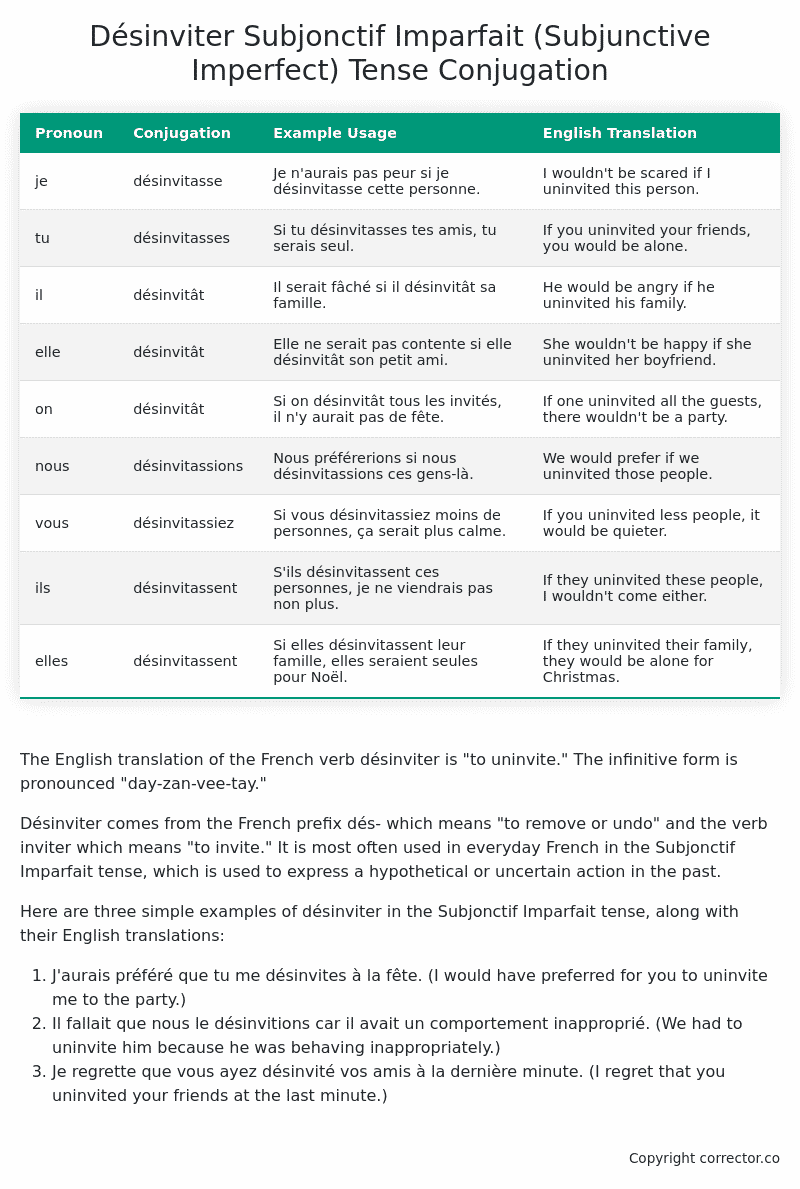Subjonctif Imparfait (Subjunctive Imperfect) Tense Conjugation of the French Verb désinviter
Introduction to the verb désinviter
The English translation of the French verb désinviter is “to uninvite.” The infinitive form is pronounced “day-zan-vee-tay.”
Désinviter comes from the French prefix dés- which means “to remove or undo” and the verb inviter which means “to invite.” It is most often used in everyday French in the Subjonctif Imparfait tense, which is used to express a hypothetical or uncertain action in the past.
Here are three simple examples of désinviter in the Subjonctif Imparfait tense, along with their English translations:
- J’aurais préféré que tu me désinvites à la fête. (I would have preferred for you to uninvite me to the party.)
- Il fallait que nous le désinvitions car il avait un comportement inapproprié. (We had to uninvite him because he was behaving inappropriately.)
- Je regrette que vous ayez désinvité vos amis à la dernière minute. (I regret that you uninvited your friends at the last minute.)
Table of the Subjonctif Imparfait (Subjunctive Imperfect) Tense Conjugation of désinviter
| Pronoun | Conjugation | Example Usage | English Translation |
|---|---|---|---|
| je | désinvitasse | Je n’aurais pas peur si je désinvitasse cette personne. | I wouldn’t be scared if I uninvited this person. |
| tu | désinvitasses | Si tu désinvitasses tes amis, tu serais seul. | If you uninvited your friends, you would be alone. |
| il | désinvitât | Il serait fâché si il désinvitât sa famille. | He would be angry if he uninvited his family. |
| elle | désinvitât | Elle ne serait pas contente si elle désinvitât son petit ami. | She wouldn’t be happy if she uninvited her boyfriend. |
| on | désinvitât | Si on désinvitât tous les invités, il n’y aurait pas de fête. | If one uninvited all the guests, there wouldn’t be a party. |
| nous | désinvitassions | Nous préférerions si nous désinvitassions ces gens-là. | We would prefer if we uninvited those people. |
| vous | désinvitassiez | Si vous désinvitassiez moins de personnes, ça serait plus calme. | If you uninvited less people, it would be quieter. |
| ils | désinvitassent | S’ils désinvitassent ces personnes, je ne viendrais pas non plus. | If they uninvited these people, I wouldn’t come either. |
| elles | désinvitassent | Si elles désinvitassent leur famille, elles seraient seules pour Noël. | If they uninvited their family, they would be alone for Christmas. |
Other Conjugations for Désinviter.
Le Present (Present Tense) Conjugation of the French Verb désinviter
Imparfait (Imperfect) Tense Conjugation of the French Verb désinviter
Passé Simple (Simple Past) Tense Conjugation of the French Verb désinviter
Passé Composé (Present Perfect) Tense Conjugation of the French Verb désinviter
Futur Simple (Simple Future) Tense Conjugation of the French Verb désinviter
Futur Proche (Near Future) Tense Conjugation of the French Verb désinviter
Plus-que-parfait (Pluperfect) Tense Conjugation of the French Verb désinviter
Passé Antérieur (Past Anterior) Tense Conjugation of the French Verb désinviter
Futur Antérieur (Future Anterior) Tense Conjugation of the French Verb désinviter
Subjonctif Présent (Subjunctive Present) Tense Conjugation of the French Verb désinviter
Subjonctif Passé (Subjunctive Past) Tense Conjugation of the French Verb désinviter
Subjonctif Imparfait (Subjunctive Imperfect) Tense Conjugation of the French Verb désinviter (this article)
Subjonctif Plus-que-parfait (Subjunctive Pluperfect) Tense Conjugation of the French Verb désinviter
Conditionnel Présent (Conditional Present) Tense Conjugation of the French Verb désinviter
Conditionnel Passé (Conditional Past) Tense Conjugation of the French Verb désinviter
L’impératif Présent (Imperative Present) Tense Conjugation of the French Verb désinviter
L’infinitif Présent (Infinitive Present) Tense Conjugation of the French Verb désinviter
Struggling with French verbs or the language in general? Why not use our free French Grammar Checker – no registration required!
Get a FREE Download Study Sheet of this Conjugation 🔥
Simply right click the image below, click “save image” and get your free reference for the désinviter Subjonctif Imparfait tense conjugation!

Désinviter – About the French Subjonctif Imparfait (Subjunctive Imperfect) Tense
Formation
Common Everyday Usage Patterns
Interactions with Other Tenses
Subjonctif Présent
Indicatif Passé Composé
Conditional
Conditional Perfect
Summary
I hope you enjoyed this article on the verb désinviter. Still in a learning mood? Check out another TOTALLY random French verb conjugation!


